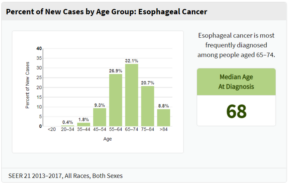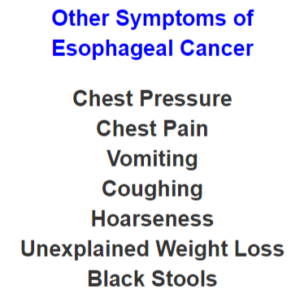Pain or trouble swallowing, food getting stuck in your throat or chest, can be esophageal cancer.
If your doctor says this is anxiety, you should quickly dismiss this diagnosis.
A 34-year-old woman was experiencing pain swallowing and went to a doctor.
She was told it was anxiety. The symptom went away for a few weeks, but soon was replaced by trouble swallowing.
Again, her doctor chalked it up to anxiety, even asking her what was going on in her life.
As swallowing food became increasingly difficult, to the point that it was being regurgitated, she was finally diagnosed with esophageal cancer. Several months later she was dead from this disease.
This young woman’s esophageal cancer had been outright misdiagnosed as anxiety!
Yes, anxiety can interfere with swallowing. But the way this happens is markedly different from the way it occurs with esophageal cancer.
When the woman’s symptoms had gotten pretty bad, she finally asked her doctor if cancer could be the cause.
In her YouTube video, she quotes his response as, “Unless you’re a man over 55 who’s been smoking for 20 years, you don’t have to worry about cancer.”
Anxiety or Esophageal Cancer?
“Esophageal cancer is uncommon in folks in their 30s — but the ‘golden rule’ is dysphagia should always be evaluated — at minimum with an UGI X-ray,” says Alex Little, MD, a thoracic surgeon with a special interest in esophageal and lung cancer.
Dysphagia is the medical turn for trouble swallowing.
The sensation of dysphagia can occur in the throat or chest.
In fact, doctors consider swallowing to include the phase in which food goes down the throat and down the esophagus and into the stomach, rather than just the component of clearing the throat.
Trouble swallowing from esophageal cancer is caused by the tumor causing a blockage, making it difficult for food to get past.
The patient will feel this as food getting stuck or trapped, or sticking, somewhere in the throat or chest.
When someone is overcome with anxiety, there may be trouble with swallowing – even in the absence of food or liquid.
But, unlike the woman in the video, anxiety will not cause just-swallowed food to come back up and into the throat.
Her tumor was at the bottom of her esophagus. The food eventually couldn’t get past the cancer and came back up. Even water came back up.
It was at this point that this young woman was finally diagnosed properly. By then, the disease was at stage 4 and terminal.

As you can see, young women CAN get esophageal cancer. But the age group of 20 to 34 represents only 0.4% of cases.
Dr. Little explains, “During my practice it was not unusual to see a female patient (typically older I admit) who was reassured with a condescending attitude that it was anxiety and ‘all in their mind.’”
The comments to the woman’s video support this. If you read through them, it won’t be long before you’ll find women who’ve been told by their doctor that a physical symptom was being caused by anxiety.
However, if a man has an intuition that his symptoms are being caused by cancer (or an ulcer, hernia, etc.), he should never accept anxiety as a diagnosis.

Here is the link to the video in which a young woman describes her esophageal cancer being misdiagosed as anxiety. She was dead five months later.
 Alex Little, MD, trained in general and thoracic surgery at the Johns Hopkins University School of Medicine; has been active in national thoracic surgical societies as a speaker and participant, and served as president of the American College of Chest Physicians. He’s the author of “Cracking Chests: How Thoracic Surgery Got from Rocks to Sticks,” available on Amazon.
Alex Little, MD, trained in general and thoracic surgery at the Johns Hopkins University School of Medicine; has been active in national thoracic surgical societies as a speaker and participant, and served as president of the American College of Chest Physicians. He’s the author of “Cracking Chests: How Thoracic Surgery Got from Rocks to Sticks,” available on Amazon.
 Lorra Garrick has been covering medical, fitness and cybersecurity topics for many years, having written thousands of articles for print magazines and websites, including as a ghostwriter. She’s also a former ACE-certified personal trainer.
Lorra Garrick has been covering medical, fitness and cybersecurity topics for many years, having written thousands of articles for print magazines and websites, including as a ghostwriter. She’s also a former ACE-certified personal trainer.
.



























